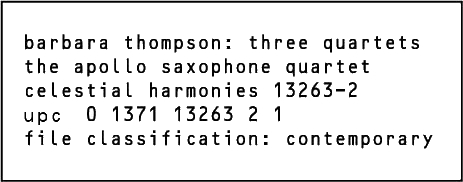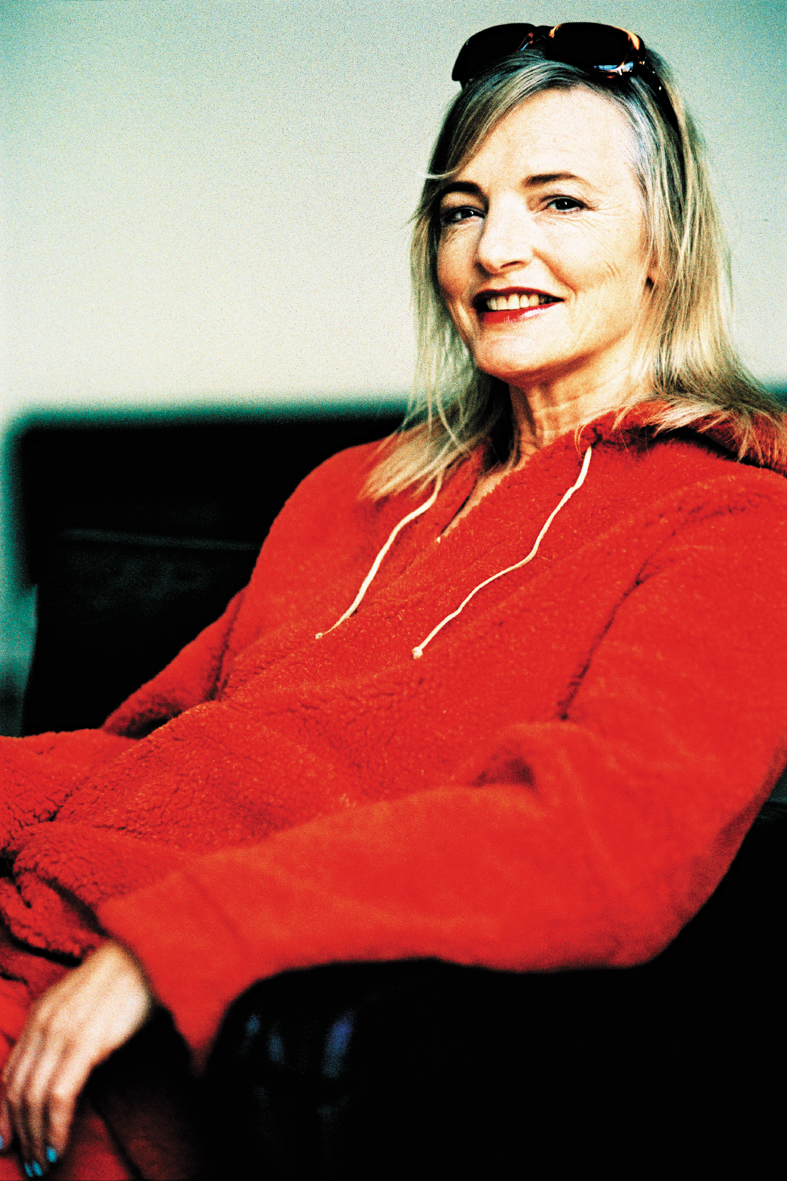 |
 
the projectGeoff Brown's review of an April 2003 concert in the London Times read: Jazz rhythms met minimalism in a lyrical embrace. Motifs and patterns intertwined and chased tails in music instantly attractive, but never vacuous. Allied to the music's ebullience came the phenomenal skill of the Apollo Four. Thompson's writing made their fingers scamper off their knuckles in search of new swoops and gurgles, or the silkiest transformation from furnace blast to the softest whisper this side of the Milky Way. Writes Barbara Thompson, "When Rob Buckland offered me a commission to write a piece for the Apollo Saxophone Quartet (ASQ) to be presented at the Brighton Festival, 2001, I was both pleased and apprehensive. Writing for a Saxophone Quartet presents similar challenges to writing for a String Quartet with the additional problem of having to leave spaces for breathing! "I have always thought of the saxophone as having an emotional range similar to that of the human voice. Its versatility knows no bounds and the ASQ, with their incredible virtuosity and musicalty, helped me to take chances and live dangerously. The ASQ certainly rose to the challenge. Together, we have explored many aspects of the saxophone and sometimes found ourselves deep in uncharted waters. 'Carried away with the successful premiere of the first quartet and its inclusion in the ASQ's repertoire, I set about writing the second and third quartets. Listening now it seems as if they wrote themselves, probably the result of my own long-time love affair with all the saxophone family." Saxophone Quartet No. 1 in five movements is in reality one piece, divided into five sections. There are recurring phrases throughout, distanced by pace and mood. All the saxophones are used as musical rhythm machines, with melodies and textures being taken in turn by individuals. Occasionally all four saxes combine with the same phrase, and then swoop apart like birds. Saxophone Quartet No. 2 from darkness into light is six movements based on different colours. From the primeval scream to the calm and peaceful finale with a chorale scored for the wonderful sound of four soprano saxes, sounding like female voices. Saxophone Quartet No. 3 body language is a continuous
piece based on a series of dance motifs: from the mad latin of
the second movement Carnival to the more traditional atmosphere
of the fourth movement County Ayre. There are five bridges,
entitled Serena I-V, linking the beginning and end of each
of the four movements. Each Serena is calm and peaceful, and they
are all variations on the same theme, breathing spaces between
the movements. the composer/performersBarbara Thompson was born in Oxford in 1944 and educated at Queen's College, Harley Street, London, and the Royal College of Music, where she studied clarinet, piano, flute and composition. Whilst retaining a strong interest in classical music, Barbara was captivated by the jazz work of Duke Ellington and John Coltrane and developed a consuming passion for the saxophone. She formed her own group Paraphernalia in 1977, and it is still one of the major instrumental attractions on the European concert scene. Barbara's original and inventive compositions and soaring saxophone and flute improvisations have earned her international acclaim, while the originality of the music has appealed to a far wider audience than merely contemporary jazz buffs. In 1996, Barbara was awarded the M.B.E. for services to music as a musician and composer. Following her diagnosis with Parkinson's Disease in 1977, Barbara decided that—as her live appearances became curtailed—she would concentrate on her concert music composing career. This album represents the first results of this decision and to date four of her concertos for various solo instruments and ensembles are being regularly performed. Her previous recording for Celestial Harmonies is the 1990 solo saxophone album Songs From the Center of the Earth (Black Sun Music 15014-2), recorded to take advantage of the remarkable acoustics in the 12th century Abbaye du Thoronet in Provence, France. Established at the Royal Northern College of Music in 1985, the Apollo Saxophone Quartet set out to develop an original repertoire from a wide variety of cultures and disciplines. By commissioning and performing new works by today's leading composers, the group have firmly maintained their position at the forefront of contemporary performance, playing at major festivals and concert venues throughout Europe and Japan.
|
|
|
 |



